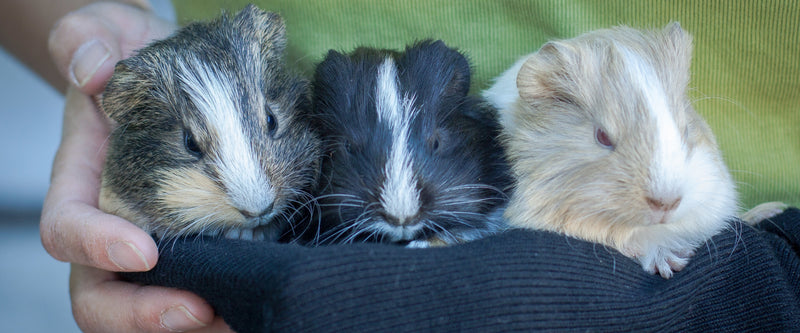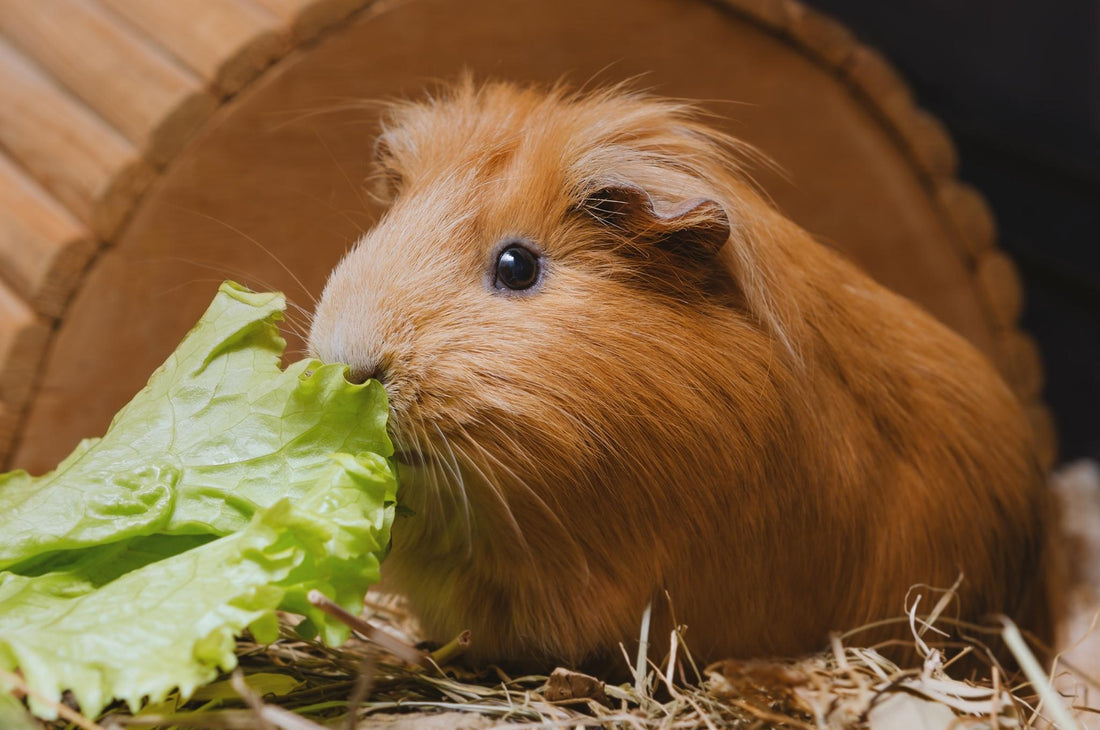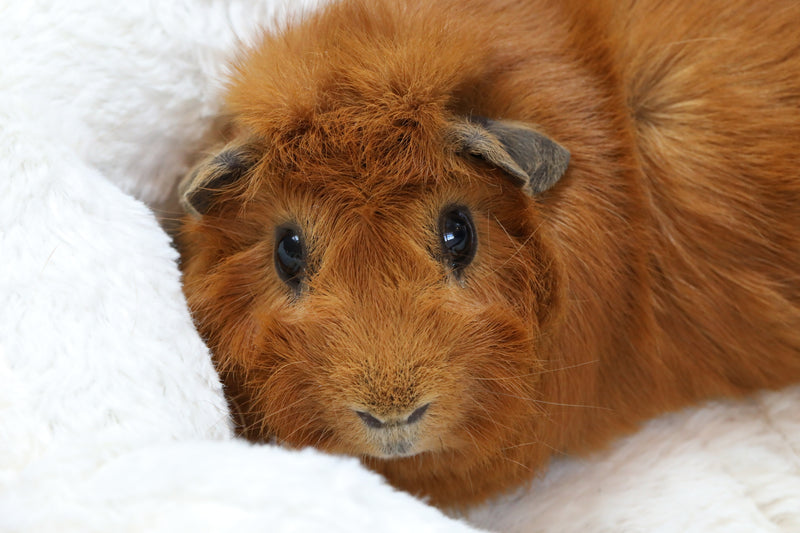
- 25 November 2021
- guinea pigs

Let's take a look at some of the most frequently asked questions about guinea pigs asked across the internet.
As pets, guinea pigs usually live for 5-6 years, but they sometimes can live longer.

Guinea pigs use a variety of noises that sound a lot like squeaks to communicate their feelings and needs. The chirrup is used as a way to get attention or demonstrate upset, while the chut usually means that the guinea pig is content. Screaming usually indicates that the guinea pig is scared, while squealing might mean that they are in pain or being bothered by another animal.
The most well-known noise is the week, which is when the guinea pig is either excited or hungry. It's a good idea to pay attention when you hear your piggy making some of these noises so that you can recognise them and understand how they are feeling.
Grapes are a popular fruit that is packed with a variety of nutrients for your guinea pig. They are a great source of vitamin C, protein, magnesium, phosphorus, and calcium. Additionally, they contain high levels of antioxidants. Grapes are fine as a special treat, but should not be a staple in your piggy's regular diet because they are high in sugar which can cause an imbalance in intestinal bacteria.
To make eating grapes easier for your guinea pig cut them into halves or quarters. Seedless grapes are the best because they minimise the risk of choking, but you can remove the seeds from normal grapes if you can't find seedless ones. The recommended serving size is one to two medium-sized grapes per week, according to most experts.

Carrots are a safe vegetable to give your guinea pig in moderation. The sugar in carrots can cause diarrhoea or other health problems if you give your piggy too much carrot.
There is a lot of nutrition in the skin and just under the skin of a vegetable so there is no need to peel them. In fact, if you are peeling carrots for your own meal, you can give the carrot skin to your piggies. But always make sure you wash them thoroughly and, if you can, try and buy organic carrots. Carrots with the leafy greens on are also safe and nutritious for your piggies to consume in moderation.
Don’t forget to also give your piggies enough fresh drinking water and a plentiful supply of premium quality hay. Not only is it high in fibre and low in sugar to help support a healthy digestive system, it’s also great to chew on too – helping to reduce your guinea pig’s potential boredom.
If you want to offer your guinea pig apple slices, go right ahead! Vitamin C is an important nutrient for guinea pigs, and it is abundant in apples. The apple skin also has fibre, which is good for your piggy. However, the fruit is also high in sugar, so only give apples occasionally as a special treat for your pet.
Ripe, red apples are the best type to feed your piggy. Green apples and unripe apples can be more acidic, which can irritate your guinea pig's mouth.

Guinea pigs are not typically considered nocturnal animals, though they may exhibit some nocturnal behaviour. Nocturnal animals are active at night and sleep during the day. Guinea pigs do sleep during the day, but usually not for very long. And they do sleep at night, but not for the whole night, so they aren't diurnal either. Guinea pigs are actually crepuscular, which means they tend to be active during dusk and dawn.
Lots of people assume guinea pigs come from Guinea. However, that's actually not the case. The guinea pig originated in the Andes, South America. The guinea pig is a domesticated animal, that isn't found naturally in the wild. Guinea pigs are a popular pet because they're easy to care for and have a friendly nature.
Guinea pigs aren’t natural swimmers and they don't like being in the water. Physiologically, guinea pigs are not built for swimming and their little arms and legs do not have the muscles to paddle around in the water for any amount of time. Guinea pigs just don’t have the stamina for this type of exercise and if you force them to try and swim they can drown. Their bodies tend to become stressed very easily and exposure to cold water puts them at risk of illness or even death.

No, they don’t. As we discovered earlier, guinea pigs originated in South America, so low temperatures are not part of guinea pigs' natural habitat and they don't hibernate like animals from colder climates do. Your piggy doesn't hibernate, so he or she will need special care when cold weather hits. Make sure you keep their living conditions warm at all times with temperatures above 15°C. Move them to a warmer place as soon as the temperature gets lower than this.
It's critical to keep your pet's habitat warm at all times to avoid any potential health issues. If your guinea pig gets too cold, their small body size can result in hypothermia symptoms setting in quickly. These include shivering/limpness, loss of appetite and reduced activity levels. If you discover that your guinea pig is becoming lethargic in the cold winter months, take them to the vet right away.
Guinea pigs don’t usually enjoy the water and being wet so bathing can be a challenge. Luckily, they only need to be bathed a few times a year. Bathing your guinea pig too often can cause unnecessary stress for them - and for you! When bathing your piggy in a bathtub, make sure that the water is shallow enough for them to comfortably stand without water being close to their eyes, ears or nose.
Simply scoop up some water and carefully pour it over them with one hand, using the other hand to protect their head and prevent water from getting into their ears, nose or eyes. When their body is wet, use your fingertips to gently wet their head, being mindful not to get water into their ears, nose or eyes.
Apply a very small amount of gentle baby shampoo or specialist guinea pig wash to your piggy and very gently lather. Be very careful near the ears as it's important not to get shampoo or water into the eardrums as guinea pigs are quite prone to ear infections. When they are lathered, rinse gently using the same method you used to wet them - one hand to scoop water on the body and protect their head. When all the soap is gone, make sure that you dry your piggy thoroughly to avoid them getting a chill.
And there we have it! The reasons why guinea pigs squeak and even more of the internet’s most searched-for questions about our beautiful piggies.

